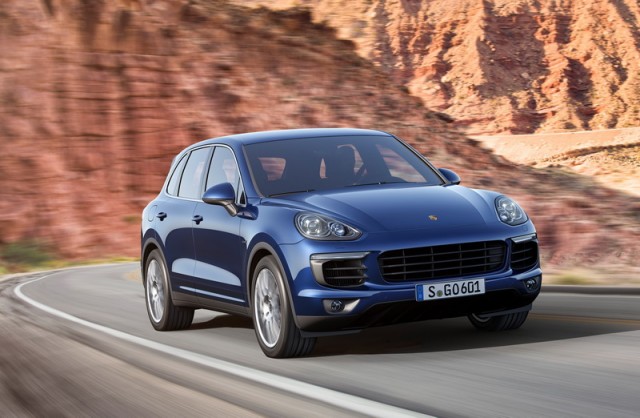With the Macan bustling onto the scene and threatening to steal all its thunder, Porsche has decided to give the larger Cayenne an overhaul, with some new drivetrains and looks inspired by the smaller SUV. Among the highlights is the announcement of a new plug-in hybrid model.
Exterior
Porsche talks about 'sharper design' and 'precise lines' in its bumf on the car, when it would be a lot easier to say 'it looks like a bigger Macan'. That, however, is no bad thing, giving the Cayenne the easiest-on-the-eye appearance it has had yet. It'll still need big wheels, a higher spec and a dark colour, in our opinion, to look ideal, but the Macan front end is welcome. Porsche has stopped short of dropping the rear number plate into the bumper, although it has tidied up the back and added three-dimensional effect light clusters.
Standard on all models at the lower end of the range are bi-Xenon lights, with quad LED daytime running lamps (DRLs) included. The Turbo gets LED headlights and the Porsche Dynamic Lighting System (PDLS) as well. Meanwhile the exhaust pipes are integrated into the lower rear sections and all Cayennes get an automatic tailgate as standard.
Interior
Subtle refreshers are the order of the day inside, with the 918-inspired steering wheel from the Macan transporting over into the Cayenne. The rear seats have been made 'more comfortable' (how is not explained) and seat ventilation can be ordered as an option. As well as the aforementioned steering wheel, auto tailgate, headlights and DRLs, all Cayennes come with front and rear Park Assist, Porsche Traction Management all-wheel drive, cruise control, a Sport button, climate control, start-stop with coasting function and a three-year warranty. The Turbo lobs in the PDLS LED lights, 19-inch alloys, Porsche Active Suspension Management (PASM) with self-levelling air suspension, Porsche Communication Management with satnav and a Bose surround sound audio system.
Mechanicals
The revised Cayenne is available to order now, with deliveries commencing from October 11, and there are five models to choose from: Cayenne Diesel, Cayenne S, Cayenne S Diesel and Cayenne Turbo represent the traditional drivetrains; while the Cayenne S E-Hybrid is the plug-in fuel-saver, said to be the first plug-in hybrid in the premium SUV segment. Indeed, with this part-electric Cayenne sitting alongside the Panamera S E-Hybrid and the 918 Spyder, Porsche is the only manufacturer to currently offer three PHEVs.
We'll try and cram a few key figures in, but suffice it to say every Cayenne powertrain in the facelifted range has improved performance and economy figures compared to equivalent previous versions. Tweaks to engines, aero and gearboxes have helped, such as active cooling air flaps being used for the first time on the SUV, although the 'Auto Stop/Start Plus' with coasting function helps.
The hybrid now has a range of 18- to 36 kilometres in all-electric mode, thanks to a 10.9kWh lithium-ion battery. The electric motor's power has more than doubled compared to the old S Hybrid, from 47- to 95hp. It is mated to a 333hp supercharged V6 petrol engine for a system peak power of 416hp at 5,500rpm. Maximum torque is 590Nm from 1,250- to 4,000rpm. Porsche quotes 83mpg (3.4 litres/100km), 79g/km of CO2, 0-100km/h in 5.9 seconds and a top speed of 243km/h, although in all-electric mode this is limited to 124km/h.
Onto more conventional power and there's a new 3.6-litre bi-turbo V6 in the Cayenne S, developed entirely in-house by Porsche. Replacing the old V8, it makes 20hp more in total, at 420hp at 6,000rpm, 50Nm extra over a wider 1,350- to 4,500rpm band (550Nm peak) and shaves 0.4 seconds off the 0-100km/h time with the eight-speed Tiptronic S auto, now completing the sprint in 5.5 seconds (5.4s with optional Sport Chrono package). Top speed is 259km/h, up from 257km/h and of course a forced induction V6 uses less fuel than a V8 - so between 29.7- and 28.8mpg (9.5 litres/100km to 9.8 litres/100km) and 223-229g/km CO2, spec depending.
Elsewhere, the basic Diesel is a 3.0-litre V6 with 262hp, 580Nm, 42.8mpg (6.6 litres/100km) economy and CO2 of 173g/km, with 0-100km/h in 7.3 seconds and 220km/h top speed. The S Diesel uses a 4.2-litre V8 to return figures of 385hp, 850Nm, 35.3mpg (8.0 litres/100km), 209g/km, 0-100km/h in 5.4 seconds and 251km/h. The range-topping Turbo has a 4.8-litre twin-turbo petrol V8 of 520hp and 750Nm capability, with 0-100km/h in just 4.5 seconds and a top speed of 278km/h. CO2 is from 261g/km while combined economy is 25.2mpg (11.2 litres/100km). On all three models, fitting Sport Chrono knocks 0.1 seconds of the 0-100km/h benchmark sprint.
Chassis tuning of the new Cayenne is said to have been optimised for even greater comfort, without ruining the handling characteristics that put the 'S' into 'SUV'.
Anything else?
Porsche sold 276,000 examples of the first generation Cayenne between 2002 and 2010; since then, the second-gen car has eclipsed that figure, with 303,000 produced so far, driving the growth of the company as a whole.
Irish pricing has yet to be confirmed.

